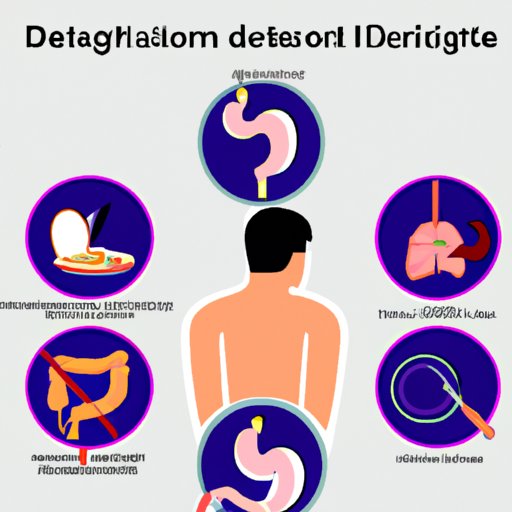
I. Introduction
Gastrointestinal diseases are widespread health problems that affect people of all ages. They can cause severe discomfort and even lead to life-threatening complications. This article offers a comprehensive overview of gastrointestinal diseases, including common types, signs, symptoms, treatments, and lifestyle changes that can help alleviate their effects.
II. Understanding Gastrointestinal Diseases: A Comprehensive Overview
The gastrointestinal system, also known as the digestive system, comprises various organs involved in the process of food digestion, absorption, and excretion, such as the mouth, esophagus, stomach, small and large intestines, liver, pancreas, and rectum. Gastrointestinal diseases refer to any conditions that affect the normal functioning of these organs.
Common types of gastrointestinal diseases include inflammatory bowel disease (IBD), such as Crohn’s disease and ulcerative colitis; irritable bowel syndrome (IBS); gastroesophageal reflux disease (GERD); celiac disease; and peptic ulcer disease. These diseases can occur due to various factors, including genetic predisposition, bacterial or viral infections, stress, inadequate nutrition, and lifestyle choices.
The signs and symptoms of gastrointestinal diseases can vary depending on the type and severity of the condition. However, some common symptoms include abdominal pain, bloating, constipation, diarrhea, nausea, vomiting, weight loss, and rectal bleeding. If left untreated, some gastrointestinal diseases can lead to complications such as malnutrition, dehydration, anemia, intestinal obstruction, and cancer.
III. Common Gastrointestinal Diseases and How to Identify Them
Gastroesophageal reflux disease (GERD), commonly known as acid reflux, occurs when the content of the stomach backs up into the esophagus, causing a burning sensation in the chest and throat. Common triggers for GERD include acidic foods, alcohol, coffee, and tobacco. Treatment options for GERD include medication, lifestyle changes, and surgery.
Inflammatory bowel disease (IBD) is a chronic disorder characterized by inflammation of the intestinal lining. The two major types of IBD are Crohn’s disease, which can affect any part of the gastrointestinal tract, and ulcerative colitis, which affects the colon and rectum. Symptoms of IBD include abdominal pain, diarrhea, fever, fatigue, and weight loss. Treatment options for IBD include medication, dietary changes, and surgery.
Irritable bowel syndrome (IBS) is a functional gastrointestinal disorder that affects the large intestine. IBS can cause abdominal pain, bloating, gas, constipation, and diarrhea, or a combination of both. The exact cause of IBS is unknown, but factors such as stress and diet can trigger or aggravate symptoms. Treatment options for IBS include medication, dietary changes, and stress management techniques.
Celiac disease is an autoimmune disorder characterized by an intolerance to gluten, a protein found in wheat, barley, and rye. When people with celiac disease consume gluten, it triggers an immune response that damages the lining of the small intestine. Symptoms of celiac disease include diarrhea, abdominal pain, bloating, fatigue, and weight loss. Treatment options for celiac disease include a gluten-free diet, medication, and nutritional supplements.
Peptic ulcer disease is a digestive disorder caused by the erosion of the lining of the stomach or duodenum, which is the first part of the small intestine. The most common cause of peptic ulcers is a bacterial infection called Helicobacter pylori. Other factors that can cause peptic ulcers include stress, smoking, and nonsteroidal anti-inflammatory drugs (NSAIDs). Symptoms of peptic ulcer disease include abdominal pain, bloating, nausea, and vomiting. Treatment options for peptic ulcer disease include medication, lifestyle changes, and surgery.
IV. A Guide to the Most Common Gastrointestinal Disorders
Gastrointestinal disorders are a growing public health concern worldwide. According to the National Institute of Diabetes and Digestive and Kidney Diseases (NIDDK), around 60 to 70 million people in the United States are affected by gastrointestinal disorders.
Detecting and diagnosing gastrointestinal disorders can involve various tests and procedures, such as blood tests, stool analysis, endoscopy, colonoscopy, and imaging scans. These tests can help detect abnormalities in the gastrointestinal tract, such as inflammation, ulcers, tumors, or obstructions.
The implications of gastrointestinal disorders can vary depending on the type and severity of the condition. Some common implications of gastrointestinal disorders include malabsorption of nutrients, anemia, dehydration, electrolyte imbalances, and bowel obstruction. In severe cases, gastrointestinal disorders can lead to complications such as cancer, liver disease, and bowel perforation.
V. Exploring the Symptoms and Treatment of Gastrointestinal Disease
Symptoms of gastrointestinal diseases can cause functional limitations and social isolation. The most common symptoms of gastrointestinal diseases include abdominal pain, bloating, gas, diarrhea, and constipation. The severity of these symptoms can vary depending on the type and progression of the disease. It is essential to seek medical help if you experience persistent or severe symptoms of gastrointestinal diseases.
Medical treatments for gastrointestinal diseases can vary depending on the underlying cause and the severity of the condition. For example, medication such as antacids, proton pump inhibitors, or antibiotics can help alleviate the symptoms of GERD and peptic ulcer disease. Inflammatory bowel disease may require immunosuppressive drugs, corticosteroids, or biologic therapies to reduce inflammation and promote healing.
Alternative treatments for gastrointestinal diseases can complement medical treatments and help alleviate some symptoms. Such treatments include acupuncture, herbal supplements, probiotics, and gut-directed hypnotherapy. However, it is essential to consult a healthcare provider before trying alternative treatments for gastrointestinal diseases.

VI. Gastrointestinal Diseases: What You Need to Know
Living with gastrointestinal diseases can be challenging, but finding the right support and resources can make it easier. It is crucial to develop a sound understanding of the disease, including its symptoms, triggers, and treatment options. In addition, it is essential to maintain good nutrition, hydration, and stress management practices to minimize the impact of gastrointestinal diseases.
Home remedies for gastrointestinal diseases can also help alleviate some of the symptoms. These remedies include drinking plenty of water, avoiding spicy or greasy foods, consuming fiber-rich foods, and engaging in gentle exercise, such as yoga or walking.
People with gastrointestinal diseases may also need to make dietary changes to avoid trigger foods and consume foods that are easy to digest. Foods to avoid include spicy, greasy, and fatty foods; caffeine; alcohol; dairy products; and high-fiber foods. Foods that are easy to digest include low-fat proteins, such as chicken and fish, white rice, cooked vegetables, and low-acid fruits, such as bananas and melons.
VII. The Impact of Gastrointestinal Disease on the Body
Gastrointestinal diseases can affect not only physical health but also emotional well-being. The chronic pain, fatigue, and lifestyle changes associated with gastrointestinal diseases can hinder social connections and mental health. People with gastrointestinal diseases may experience anxiety, depression, low self-esteem, and stigma. Therefore, it is crucial to receive emotional support and counseling when living with gastrointestinal diseases.
Gastrointestinal diseases can also have implications for other aspects of health. For example, research has linked gastrointestinal diseases to an increased risk of cardiovascular disease, osteoporosis, and liver disease. Therefore, seeking early detection and treatment of gastrointestinal diseases can help prevent or reduce the risk of these complications.
VIII. Preventing and Managing Gastrointestinal Disorders: A Holistic Approach
Preventing and managing gastrointestinal disorders require a holistic approach that considers various factors, including lifestyle choices, nutrition, and stress management.
Lifestyle changes that can prevent gastrointestinal diseases include quitting smoking, reducing alcohol intake, avoiding trigger foods, and engaging in physical activity regularly. Maintaining a healthy weight, getting adequate sleep, and avoiding stress can also help prevent gastrointestinal disorders.
Diet also plays a crucial role in preventing and managing gastrointestinal diseases. A healthy diet should include a variety of nutrient-rich foods, such as fruits, vegetables, whole grains, lean proteins, and healthy fats. In addition, consuming enough fiber, drinking plenty of water, and avoiding trigger foods can help minimize the symptoms of gastrointestinal diseases.
IX. Conclusion
In conclusion, gastrointestinal diseases are widespread health problems that can cause severe discomfort and complications. Understanding the symptoms, types, and treatment options for gastrointestinal diseases can help people lead healthier lives. In addition, seeking early detection and treatment of gastrointestinal diseases and adopting a holistic approach to disease prevention and management can reduce the risk of complications. Therefore, it is essential to seek medical help when necessary and maintain a healthy lifestyle to minimize the impact of gastrointestinal diseases.




